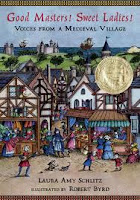It seems like the theme for this week is knowing the setting. Cynthia Voigt's
Dicey's Song is set in Crisfield Maryland, not far from where I grew up. Well, I grew up on the Western Shore or Maryland so to drive to Crisfield would take about 3 and a half hours because you can only cross the Bay in one place. But I completely understood this scene. Dicey's grandmother is searching the attics for winter coats for the children because winter is coming. "Dicey doubted that it ever got cold here in Southern Maryland." Today I drove from State College to Southern Maryland, State College was hot BUT Maryland is way hotter. Throughout the long summer that stretches through September and sometimes even October you wonder if it will ever get cold. It does, but State College is colder-I'll take the cold.
This story is one of Dicey coming of age, being told she's too young to walk around without a shirt, being tricked into shopping for her first bra (clever grandma), and enjoying her first taste of flirting which Dicey described as, "this was a pretty stupid conversation, but she was enjoying it." All of this change didn't matter to Dicey because, as her brother put it, "Dicey doesn't mind as long as she knows what to do about things." In this I am like Dicey-a planner. But more than that it's that I like to have things resolved in my mind. The what if game doesn't really bother me because I know if I just think about it I can come up with a solution for every what if and then I don't mind because I know what to do about things.
I am also like Dicey's siblings. Like her sister Maybeth I know how to interpret notes of music because, "it's just the way it sounds when it sounds right." 4 years of music school and I still have the same explanation as a girl in her first year of piano lessons-that's just how it sounds right. I am like James who when, "he had a report to do on the pilgrims and he was trying to pick a subject. He told Dicey He didn't want any help, he had lots of ideas, it was just a matter of finding the right one...He wanted the other kids to like his." And I am like Sammy because I want to be good but sometimes I just need to fight.
In middle school we had to read
Homecoming which is a book about this same family but it takes place before
Dicey's Song. I didn't feel this way about any of the characters then. Perhaps it was because the rest of my classmates though the book was silly and so I didn't want to like it-just so I could fit in and have something to say during the lunchroom chatter. Or perhaps the Tillermans and I needed to grow up a little before we could really see our similarities.
Fighting for your family, knowing what to do about things...
that's kids stuff.








